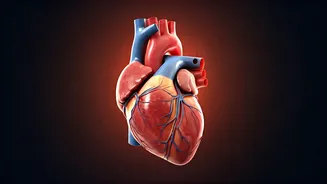Steering Clear of
In an effort to keep hearts in good condition, people should avoid certain behaviors. Firstly, excessive smoking should be avoided. Smoking damages blood
vessels, increasing the risk of blockages and heart attacks. Secondly, it is very important to avoid a diet rich in saturated and trans fats. These fats increase bad cholesterol levels, contributing to plaque buildup in arteries. Thirdly, people need to limit excessive alcohol consumption. Heavy drinking can raise blood pressure and damage the heart muscle. Lastly, chronic stress should be managed. Stress releases hormones that can elevate blood pressure and strain the heart. Individuals should work on stress-reducing methods like yoga and meditation.
Dietary Adjustments Needed
Adjusting the diet plays a vital role in keeping your heart healthy. Consuming a diet rich in fruits, vegetables, whole grains, and lean proteins is essential. These foods provide vital nutrients, antioxidants, and fiber, which helps in maintaining good cardiovascular health. Reducing intake of processed foods, sugary drinks, and excessive salt is also important, as these can negatively impact heart health. Focus on incorporating heart-healthy fats, such as those found in avocados, nuts, and olive oil, into your diet while limiting saturated and trans fats. Meal planning and preparation will also help make healthy eating a consistent part of the routine, ensuring the heart receives the necessary support.
Embracing Physical Activity
Regular exercise is a cornerstone of heart health, requiring at least 150 minutes of moderate-intensity or 75 minutes of vigorous-intensity aerobic exercise each week. This physical activity can include brisk walking, jogging, cycling, or swimming. Incorporating strength training exercises at least twice a week is also important. This helps build muscle mass and improve metabolism. Consistent physical activity helps maintain a healthy weight, lowers blood pressure, and improves cholesterol levels. It's beneficial to find activities that are enjoyable to stay motivated and make exercise a sustainable part of your lifestyle. It can be something as simple as taking the stairs instead of the elevator.
Importance of Regular Checks
Regular medical check-ups are essential to monitor your heart health. Routine check-ups help detect potential issues early on, allowing for timely intervention and preventative measures. This includes blood pressure and cholesterol level checks, and, as advised by your doctor, other tests to assess heart function. Understanding your family history of heart disease is also critical, as it can highlight your risk factors. It helps discuss any specific health concerns with a healthcare professional, ensuring you receive personalized guidance. Make it a habit to schedule annual check-ups to stay informed about your heart's condition and make necessary adjustments to your lifestyle.




















